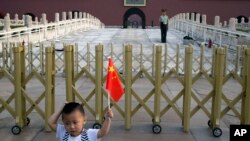China has begun releasing activists it rounded up before Wednesday's 25th anniversary of the Tiananmen Square massacre.
Human rights lawyer Shang Baojun said in an interview with VOA's Mandarin service that at least three dissidents have been set free by police in Beijing.
Xu Youyu, Hu Shigen and Liu Di had been detained last month after attending a private seminar about the Tiananmen Square crackdown. Family members for all three have confirmed their release and said they have returned home safely.
Dozens of dissidents were detained or put under virtual house arrest in the weeks leading up to the Tiananmen anniversary. Most appear to still be in custody or confined to their homes.
China annually detains dissidents ahead of the June 4 anniversary to prevent them from speaking out on the subject. Most are usually released in the weeks after the anniversary passes.
Meanwhile, China has responded angrily to U.S. calls for Beijing "to account for those killed, detained or missing in connection with the events surrounding June 4, 1989."
China's Foreign Ministry Thursday said it is "strongly dissatisfied" with the statement, which showed what it called a "total disregard of facts." In an article in the official Xinhua news agency, spokesman Hong Lei said China has "lodged solemn representations" over the comments.
Wednesday's anniversary of the Beijing massacre passed quietly in China, where public discussion of the incident is not allowed.
In Hong Kong, tens of thousands of people held candles, sang songs and listened to speeches Wednesday at a vigil to mark the anniversary.
An activist taking part in the vigil, Renz Tse, says it is crucial Beijing know Hong Kong supports democratic freedoms and opposes violence.
"We understand the importance of fighting for the democracy of the China. As Hong Kong is a part of China and nowadays the political reforms are now opposed by the Communist Party - they are trying to elect a chief executive [of Hong Kong] that only responds to the mainland China government," said Tse.
Hundreds, or even thousands, of people died on June 3-4, 1989, when troops broke up the student-led pro-democracy protests.
China's government has never given a death toll or an official statement of what happened, It defends its actions as necessary to preserve stability.
This report was produced in collaboration with the VOA Mandarin service.
Human rights lawyer Shang Baojun said in an interview with VOA's Mandarin service that at least three dissidents have been set free by police in Beijing.
Xu Youyu, Hu Shigen and Liu Di had been detained last month after attending a private seminar about the Tiananmen Square crackdown. Family members for all three have confirmed their release and said they have returned home safely.
Dozens of dissidents were detained or put under virtual house arrest in the weeks leading up to the Tiananmen anniversary. Most appear to still be in custody or confined to their homes.
China annually detains dissidents ahead of the June 4 anniversary to prevent them from speaking out on the subject. Most are usually released in the weeks after the anniversary passes.
Meanwhile, China has responded angrily to U.S. calls for Beijing "to account for those killed, detained or missing in connection with the events surrounding June 4, 1989."
China's Foreign Ministry Thursday said it is "strongly dissatisfied" with the statement, which showed what it called a "total disregard of facts." In an article in the official Xinhua news agency, spokesman Hong Lei said China has "lodged solemn representations" over the comments.
Wednesday's anniversary of the Beijing massacre passed quietly in China, where public discussion of the incident is not allowed.
In Hong Kong, tens of thousands of people held candles, sang songs and listened to speeches Wednesday at a vigil to mark the anniversary.
An activist taking part in the vigil, Renz Tse, says it is crucial Beijing know Hong Kong supports democratic freedoms and opposes violence.
"We understand the importance of fighting for the democracy of the China. As Hong Kong is a part of China and nowadays the political reforms are now opposed by the Communist Party - they are trying to elect a chief executive [of Hong Kong] that only responds to the mainland China government," said Tse.
Hundreds, or even thousands, of people died on June 3-4, 1989, when troops broke up the student-led pro-democracy protests.
China's government has never given a death toll or an official statement of what happened, It defends its actions as necessary to preserve stability.
This report was produced in collaboration with the VOA Mandarin service.




